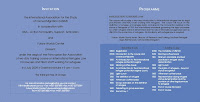
The two coordinators of the EU funded project ‘Jumpstart Youth Peace Campaign in Cyprus’ Marcia Kammitsi (Future Worlds Centre) and Huseyin Kursat (Youth Centre Union) were invited to CyBC Radio B’s ‘Round and About’ show on Wednesday 24 June at 6.30pm local time on 91.1 FM. with Rosie Charalambous. Please click here to listen to the interview or go to http://www.cybc.com.cy/index.php?option=com_content&task=view&id=675&Itemid=197. Look for the "Rosies interview with Marcia Kammitsi" on 17/06/09.
‘Round and About’ is a daily radio magazine with interviews, short talks and view on Cyprus, Europe and the world presented by Rosie.
The coordinators spoke about the Teambuilding and Leadership Workshop that took place on 19-21 June and brought together approximately 25 youth, aged 18-30 island wide for the first of a series of workshops to get to know each other in a comfortable and fun atmosphere.
The coordinators explained the aims and objectives of the project which are to not only to increase confidence building between the Turkish Cypriot and Greek Cypriot youth but also to create opportunities for the youth to actively engage in reconciliation activities. The project aims to enable the youth to challenge their own stereotypes and perceptions as well as to develop the capacity to challenge those of the community at large.
The 18 month long project will involve a series of bi communal trainings, an on line interactive platform, youth action teams, public peace marketing visual campaigns, publication of booklets and a peace and reconciliation boat tour around the island.
The presenter, Rosie, asked the coordinators which methods did they use to select participants. The coordinators answered that in the North it was easier to find participants due to the close relation of the youth centre to youth groups whereas in the South an application procedure was used and was disseminated to youth networks and groups.
Rosie raised the challenges that the project might face in recruiting new people, outside the bi communal networks. Even though this is indeed a challenge the coordinators will use the existing networks to reach new people using increased dialogue, collaboration and communication among youth in Cyprus.









